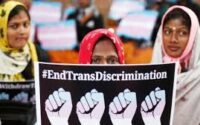CONCEPT OF NATURAL JUSTICE IN INDIA
This article is written by Nandini Srivastava of Manipal University Jaipur. This article is curated by Himanshu Raj of Chanakya National Law University, Patna.
The concept of natural justice originates way back. In the bible, it is mentioned that when Adam and Eve ate the fruit of knowledge, the forbidden fruit then the god gave a fair chance to both of them to defend them before giving them any punishment.
There are two principles of natural justice; one is Nemo judex in causa sua second is Audi alteram partem.
- Nemo judex in causa sua
This principle states that the deciding authority should be unbiased and impartial while deciding a case. Only a partial judge can make the best decision. This principle also contemplates that any man cannot be the adjudicating authority in his own case because then he might take a decision which is in his own favour. A human always tends to take decisions which benefit him because it is against human nature to do something which harms oneself. This is mentioned under Article 21 which states “No person shall be deprived of his life or personal liberty except according to the procedure established by law”. The court in the case of Kartar Singh v. State of Punjab[1] held that procedure under Article 21 refers to just, right and fair.
This principle ensures that the public does not lose confidence over the legal system of the country.
There are different types of bias and they are as follows:
- Personal bias
This is when the deciding authority has a relationship with either of the both parties involved in the dispute. The relationship can be of enmity, friendship, love or business. In any of the cases, the judgement delivered is prejudiced.
- Mineral Development Corporation Limited v. State of Bihar[2]
In this case, the petitioner was granted a mining lease in 1947 for 99 years. In 1953, the Secretary of Revenue Board accused the petitioner of violating Section 10, 12 and 14 of the Mines Act, 1952 and issued a notice whereby stated that the petitioner has to submit within 15 days an appropriate reason as to why his license should not be cancelled.
The petitioner denied all the allegations against him in his reply. However, the government quashed his license in response to which the petitioner brought a case against the minister who passed this order on behalf of the government. The petitioner stated that this decision was taken in the light of rivalry because he had not supported this government in 1952 elections. SC found this allegation to be true and thus, quashed the order passed by the minister.
- Pecuniary bias
In this, the decision maker has financial or monetary interest in the matter of dispute. The amount of pecuniary benefit is not imperative; it can either be small or large.
- Dimes v. Grand Junction Canal
This is one vital case of pecuniary bias. A Public Company Limited filed a case against a landowner. The Lord Chancellor who decided this case was a shareholder of the company. He decided this case in favour of the company because of his monetary or financial interest. His decision was later quashed by the House of Lord.
- Jeejebhoy v. Collector[3]
The Chief Justice reconstructed the bench when he became aware that one of the judges is the member of the co-operative which is involved in the dispute.
- Subject matter bias
This is when the deciding authority either directly or indirectly involved in the matter of dispute.
- Audi Alteram Partem
This means that parties in dispute should be given a fair chance of being heard. Any judgement which is delivered by violating this principle shall be held unconstitutional. This principle is derived from Article 14 of the Constitution of India, 1949.
- Maneka Gandhi v. Union of India[4]
The petitioner Maneka Gandhi’s passport was taken into legal custody without providing any opportunity to be heard on the ground of public interest. The court held this act to be unreasonable, oppressive and arbitrary.
The components of fair hearing are as follows:
- Notice
A notice should be given to the parties involved in the dispute before conducting the hearing. This should be done so that the person concerned is aware about the allegations for which he has been charged beforehand and can prepare for the case. If a person is not given any information then the arrest or any action will be unlawful. This is mentioned under Article 22(1).
- Fazalbhai v. Custodian [5]
In this case, the court pronounced that even if the statute expressly does not mention that notice should be given then also, it is compulsory to give notice.
- Kanda v. Government of Malaya[6]
It is vital that the notice is clear, precise and straightforward. A person has the right to defend himself in a case against him and for that he has to be prepared. A person cannot be punished only for the charges mentioned in the notice and not otherwise.
- Right to present case & evidence
The individual should be given appropriately reasonable time to prepare for the case.
- Right to Cross – Examination
Right to fair hearing also includes the right to cross examine. The definition of cross examination is mentioned under Section 137 of the Indian Evidence Act, 1872. It states:
“The examinations of a witness by the adverse party shall be called his cross – examination.”
The courts in India have also stated that under certain circumstances the right to cross examine will not be considered as violation of natural justice.
- Ludhiana Food Product[7]
The court held that in case any parties on its own denies to cross examine the other party then it cannot be held that violation of natural justice has taken place.
- Hari Nath Mishra v. Rajendra Medical College[8]
In this, the male student accused of indecent behaviour was not given the chance of cross – examining the girl on the ground that this would lead to an embarrassment for the girl student.
- Right of Legal Representation
Every person has the right to have legal representation and this cannot be denied. This was reiterated in the case of A.K. Roy. [9] This right is mentioned under Article 22(2) of the Constitution. One of the Directive Principles of State Policy also supports this right. Article 39 A postulates:
“The State shall secure that the operation of the legal system promotes justice, on a basis of equal opportunity, and shall, in particular, provide free legal aid, by suitable legislation or schemes or in any other way, to ensure that opportunities for securing justice are not denied to any citizen by reason of economic or other disabilities.”
The concept of natural justice is not explicitly mentioned in the Constitution yet it acts like a backbone of all the judicial, quasi- judicial, administrative and quasi – administrative actions. To ensure that authorities neither abuse their power or justice is miscarriage, this is vital.
[1] (1994) 3 SCC 569
[2] AIR 1960 SC 468
[3] AIR 1965 SC 1096
[4] AIR 1978 SC 597: (1978) 1 SCC 248
[5] AIR 1961 SC 284
[6] 1962 A.C. 322
[7] 1990 (47) ELT
[8] AIR 1973 SC 1260
[9] AIR 1982 SC 710


